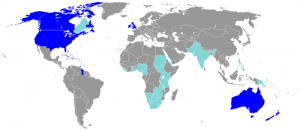It’s a fair question to ask if English dialects may eventually split off into separate languages. This has happened before, of course, Latin being perhaps the most notable example. And while I find it a compelling question, I think we’re a long way off from this split becoming a reality.
Some clarification is necessary. ‘Dialect‘ and ‘language,’ after all, are not easily separable phenomena. Italian, Chinese and Arabic are languages with ‘dialects’ that can seem like very different languages. The former Yugoslavia, on the other hand, has a number of ‘languages’ that sound an awful lot like dialects of each other (in my opinion). There are obviously subjective factors in the division of these two concepts.
One might argue, in fact, that such splits have already occurred in English. After all, the globe is dotted with numerous creoles derived from English. Yet when people wonder if English will eventually ‘split,’ I don’t think they have creoles in mind. Rather, many seem intrigued by the possibility that British English might split from American, Northern American English from Southern, or Australian from everywhere else.
I see several large barriers to English dialects becoming separate languages in our lifetime:
1.) Literacy. I realize that written and spoken language are different. But reading and writing do impact speech, and in ways more profound than many give it credit for. My own speech is affected by the way I write, and I in turn affect other people’s speech when I talk to them. Despite frequent complaints about the English-speaking world’s crumbling educational infrastructure, literacy is far more widespread than it was when Vulgar Latin was spreading across Europe. In my mind, it’s a huge impediment to the production of separate languages.
2.) Lack of geographical isolation. People simply move too much. Media is shared by too many countries. The rest of the world is too accessible. Nobody lives on a (figurative) island anymore, or some remote part of the empire accessible only by ten days’ journey on horseback. People are much more exposed to other varieties of English than they were even sixty years ago.
3.) Strong accents are not languages. When an American hears a Cockney accent (or a Cockney hears an Minnesota accent), it’s easy to get the impression of entirely different languages: they sound so different. But when you compare what people are actually saying to one another rather than how they say it, most mainstream dialects of English are not even close to splitting into languages as disparate as Spanish, French and Italian.
Of course, at an earlier date, such splits seemed more plausible. England still has various traditional dialects that are indications of a language that, from Middle English onward, may have been primed to diverge radically.
Along with many other factors, industrialization hampered this process. I don’t believe technology will erode the existence of separate languages. Nor do I think technology prohibits the creation of unique dialects, within certain limitations. But I do think advances in media and transportation will make it increasingly difficult for entirely new languages to develop. It is perhaps only in the least technologically advanced parts of the globe that English may produce offspring.
But will English eventually go the path of Latin, giving birth to a number of great national mother tongues? Maybe, but I believe it would take some fairly catastrophic, revolutionary or wildly unforseen events for that to happen soon. As things are now, this ‘split’ seems a long ways off.

